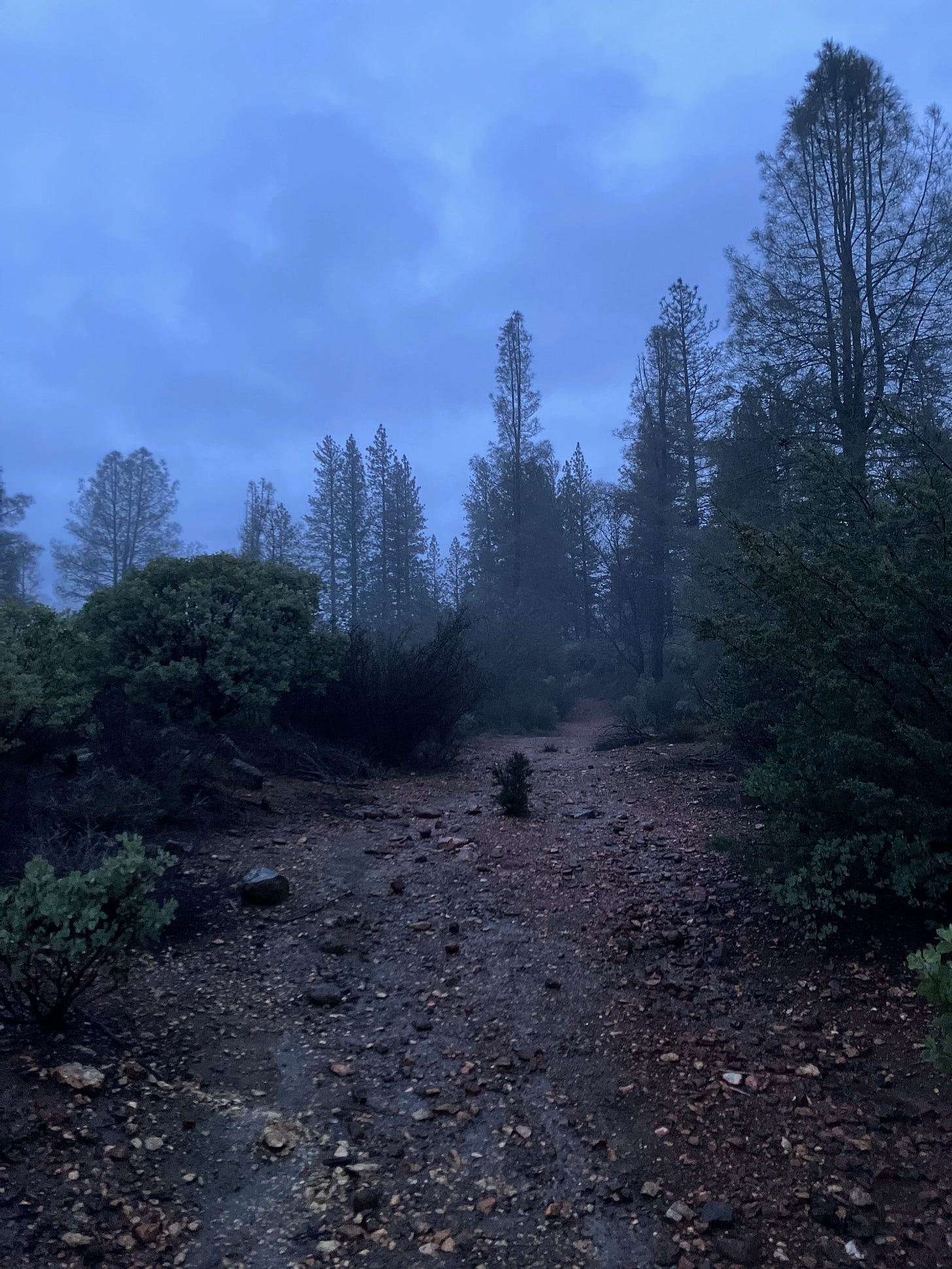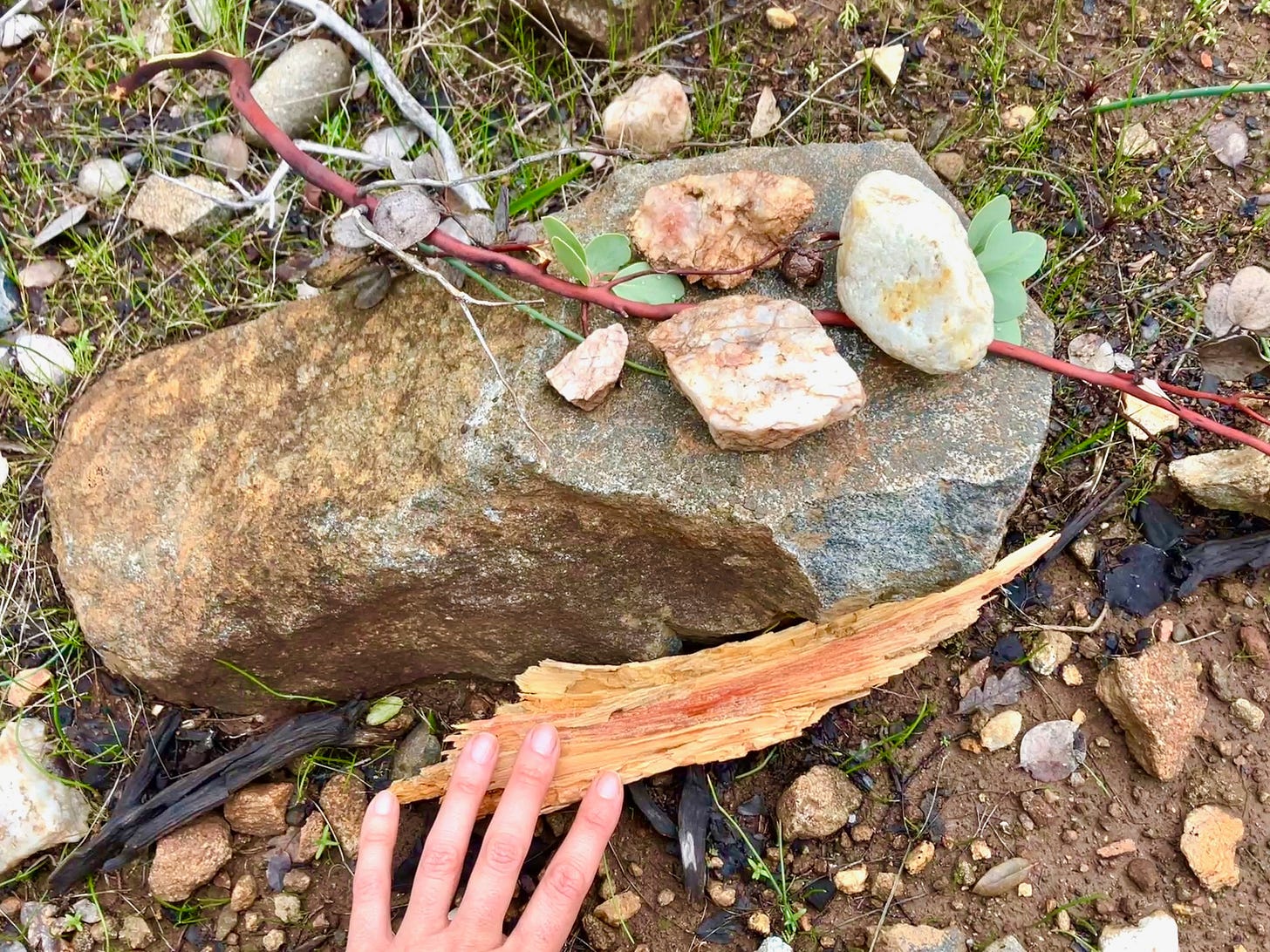
A double-sided card dangled from the red lanyard.
One side read “silence is the altar of spirit,” and this side I turned towards my heart. On the other side, a deferential “please excuse me, I am in silence,” as though silence were a student driver or waitress in training. Humble, unpracticed, in need of collective patience and understanding. That’s the side I displayed to the world.
During my weeklong retreat, I wore the lanyard any time I wasn’t in my cabin. On the third day, I forgot to slip it over my head before an optional group meditation and I spent half the time worrying someone might try to talk to me, imagining ways I could gracefully pantomime myself out of the conversation. The worry was for naught because no one tries to talk to you while they’re meditating. But it illustrates how the lanyard was a garment imbued with special powers, not unlike an invisibility cloak or a glass slipper. While it was on, I was granted immunity from small talk. I wasn’t a viable set of ears for others’ musings or complaints. I didn’t have to bother with appeasements or unwanted flirting or emotional caretaking. This is spectacularly freeing when you identify as a woman.
I wasn’t on the hook for expressing myself, either. Experiences stirred, bloomed, and receded without ever passing my lips. As a naturally contemplative touchy-feely type fascinated by my own interiority, the lanyard became a permission slip to be radically myself.

But: I love talking. Love it. My answer to the perennial question “what superpower do you wish you had?” has long been fluency in every language. A former actor, I studied the International Phonetic Alphabet in grad school and became fascinated by the phonemes, fricatives, and glottal stops which constitute human language and dialect. I’m loathe to say it, but there was even a very pretentious time in my 20s when I’d refer to my voice as an “ instrument” and call the coordinating mechanisms of human vocal production the “channel.” (Forgive me.)
I don’t act anymore, but my current work as a mental health professional is predicated on dialogue and encouraging thoughtful expression with my clients. At home, I chat with the dog almost as much as I do my boyfriend. And as a single mom to an 11-year-old boy, there’s no shortage of discussion being had on the topic of, well, everything.

But last year, my father died suddenly in his sleep. He was young and healthy, a month shy of his 65th birthday. The experience was “shocking” and “devastating.” But these are not adequate words to describe it. And words like “heartbreak,” “sadness,” and “grief,” felt as bland and pasty in my mouth as boiled turnips. I spent a year choking on them.
About six months after the death, I wrote in my journal: “This is still the worst. There are no new or interesting or even coherent words for it. Who has the energy to talk about grief while still in the throes of it?” And I was in the throes of it. I felt like an animal in a human costume, tormented by half-formed thoughts reminding me of the misery and loss, which I could only adequately express as keens or groans or sobs.
Too soon, I had to perform functioning humanness back at work and out in the world. But I found the language network of my brain only partially willing to assist me in the charade. At times I’d feel sentimental for my acting days—specifically the predictability of scripted dialogue and the tidiness of life played out in clearly delineated acts. I also found myself thinking a lot about Samuel Beckett. Beckett’s prose is brutal yet beautiful, sparsely relentless, and seductively threatening. The lines march towards certain disaster while pulsing with a secret hope.

In his 1972 play, “Not I,” the stage is masked in black curtains, with a tight spotlight illuminating just the mouth of a single actor who’s otherwise obscured (see photo below). The short piece begins with unintelligible sounds spewing from the disembodied mouth (ten seconds only, per Beckett’s exacting stage direction) then organize into maniacal, incessant blabber:
“No idea what she’s saying… imagine!.. no idea what she ‘s saying!.. and can’t stop… no stopping it… she who but a moment before… but a moment!.. could not make a sound… no sound of any kind… now can’t stop… imagine!.. can’t stop the stream… and the whole brain begging… something begging in the brain… begging the mouth to stop… pause a moment… if only for a moment… and no response… as if it hadn’t heard… or couldn’t… couldn’t pause a second… like maddened… all that together… straining to hear… piece it together… and the brain… raving away on its own… trying to make sense of it… or make it stop…”

The monologue goes on for roughly twelve minutes then dissolves into gibberish again as the house lights fade up. In the months following my dad’s passing, a similarly desperate and unintelligible voice played on an interior loop for most of my waking hours. Beckett said he hoped his play would “work on the nerves of the audience, not its intellect.” This is how grief worked on me.
Traumatic, life-changing experiences overwhelm the thinking mind. Contemporary Western culture molds us as “human thinkers” more than “human beings,” so our brains don’t know how to process intense experiences with the tools we’ve been handed since birth—tools like logic, language, and ideological constructs. These are human assets, certainly. But during periods of emotional extremity and existential angst, I believe we benefit more from experiences that feel elemental in their simplicity and sincerity.

Which is why, as the black curtains harbor the raving mouth in “Not I,” I retreated to the mountains and shrouded myself in silent solitude for seven days. In silence, the wounded animal of my being could be held in ways it understood. In silence, the depths of heartbreak could unfurl in wild and uncertain directions, free of phonemes and fricatives. In silence, I found acceptance for what can’t be wholly articulated by language: I am nature, so are you, and so was my father. From the depths of this nature, we live and die simultaneously. (Is there a word for this? Please comment below, if you have one.) This paradox winked at me from the altar of spirit; silence was the way for me to see it.

With this Substack, I aim to consider the ways we practice sitting at the “altars of spirit.” Altars serve as thresholds between humble humanity and something much greater. There are many doorways into these transcendent experiences: music, art, sex, psychedelics, nature, performing arts, meditation, and silence are but a few. I’m also interested in the ways we live as dialectical enigmas: We’re alive, but also dying. We’re special, but not really. We’re driven to create meaning and then become trapped by it. We have spiritual longings, then need to pee and forget all about them.
Through discussions with healers and artists about mental health and the creative process, recorded audio mindfulness practices, and reflections from the archives of my own unexpected life, I invite us to sit at the altar of spirit together.
Care to join me?
I’m a certified mental health coach with a specialization in somatic coaching. Using evidence-based models, I collaborate with clients to create intentional practices for growth. If you’re interested in working with me, click here.




Thank you for sharing this with us, for being willing to let these experiences and ideas live on outside of you - in our hearts and minds. I’m feeling really appreciative about the way your words are moving me this morning. So much love, friend.
Beautiful words flowing from your inner depths. I am glad that silence and nature allowed your internal voice to speak, and listen and unravel a bit if this human experience.